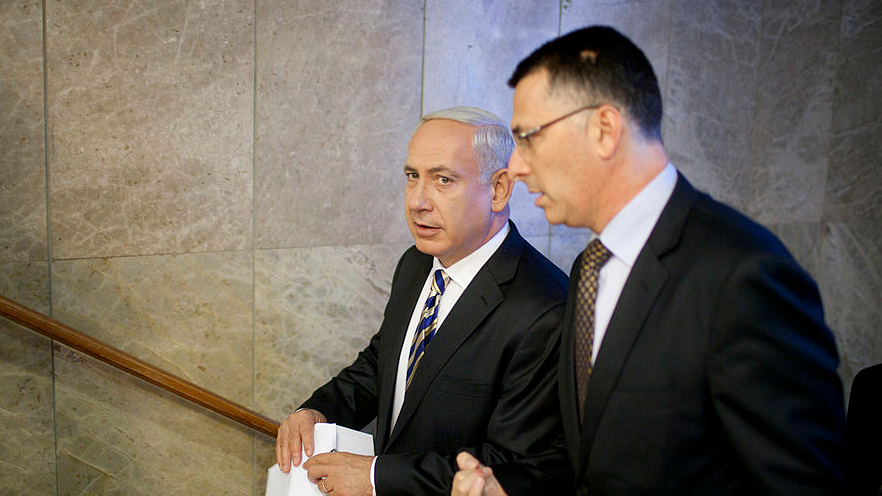
Israeli Prime Minister Benjamin Netanyahu speaks to Gideon Sa'ar, who was Israeli education minister in 2012, as they arrive for the weekly cabinet meeting in his offices in Jerusalem, Israel, August 26, 2012. /Getty
Israeli Prime Minister Benjamin Netanyahu speaks to Gideon Sa'ar, who was Israeli education minister in 2012, as they arrive for the weekly cabinet meeting in his offices in Jerusalem, Israel, August 26, 2012. /Getty
Editor's note: Hannan Hussain is a foreign affairs commentator and author. He is a Fulbright recipient at the University of Maryland, the U.S., and a former assistant researcher at Islamabad Policy Research Institute. The article reflects the author's opinions and not necessarily the views of CGTN.
In less than three weeks, Israel will witness its fourth election in two years. As the country's center-right parties contemplate new alliances, Netanyahu's scramble to retain power finds a fitting challenge in Gideon Sa'ar.
Sa'ar, a long-time Netanyahu ally, is the leader of the increasingly popular New Hope party. In recent weeks, he has tempered attacks on Netanyahu's support-base within the Likud party, effectively ruling out the risks of irking Israel's powerful center-right. Instead, his election campaigning retains emphasis on the sanctity of prosecution powers within Israel's justice system, an agenda item directly contesting Netanyahu's evasive approach to corruption charges. In a sign of early traction, the former minister successfully earned credit with veteran Likud defectors and ideologically-aligned vote-sharing partners.
In effect, this leaves Netanyahu with a complicated hunt for timely political alliances. Though his Likud party is better positioned to prevail in the upcoming snap elections, the prime minister's approach to electioneering will have a major say in determining whether he can placate right-wing rivals, and put democratic governance above personal continuity.
Netanyahu's long-delayed court proceedings took some administrative shape last month, as he pleaded "not guilty" to scores of corruption charges, and warned the courts against any pre-election "interference." Note that a similar rationale marked Netanyahu's prior postponement of accountability trials during nationwide lockdowns, confining popular support to his own party, limiting optimism for coalition guarantees beyond it.
Even so, the Israeli prime minister insists he can pull weight from his traditionally-aligned, ultra-Orthodox parties on election day, despite 61 percent of Israelis saying they don't want to see these players in the next Israeli government. It is true, ultra-Orthodox loyalists have delivered their backing for Israel's longest serving prime minister in the last three election rounds. But they have no memory of gambling on Netanyahu's leadership, once under legal scrutiny.
Then come the limits of politicizing Israel's world-leading COVID-19 vaccination drive.
Under Netanyahu's watch, more than half of the Israeli population has received its first COVID-19 vaccine dose, and this momentum is accompanied by a globally acclaimed per capita vaccination rate.
But Netanyahu's stated rationale was to vaccinate all Israelis over the age of 16 by election season to rev the Israeli economy back to its heydays. That objective has several holes.

An Israeli protester holds a fake bill with a photo of the Israeli Prime Minister Benjamin Netanyahu as she protests against the government's economy response to the coronavirus crisis in Tel Aviv, Israel, July 11, 2020. /Getty
An Israeli protester holds a fake bill with a photo of the Israeli Prime Minister Benjamin Netanyahu as she protests against the government's economy response to the coronavirus crisis in Tel Aviv, Israel, July 11, 2020. /Getty
Consider the fact that unemployment rates still hang in double-digits – thrice their pre-pandemic levels – with no noticeable drop in sight. Billions in weekly economic losses also await growth compensation, as strategies to maximize productivity remain elusive. Optimistic growth estimates from the Bank of Israel and Goldman Sachs read heavily into a single assumption: that Israel's vaccination drive is bound to maintain its rapidity post-polls.
In reality, Israel's pace of inoculations is now punctuated by frequent slowdowns, while Netanyahu – once confident of reopening the Israeli economy "completely" in March – is banking on April for a change in fortunes.
On the coalition-building front, there are several reasons why Netanyahu's task is more contentious this year. For one, several of his closest allies have marketed their ability to walk as "free" agents. Consider the Degel Hatorah party of the ultra-conservative UTJ alliance – a grouping instrumental to Netanyahu's power play in the Israeli parliament for years. Months after the party's chief went public with criticism of Netanyahu's governance during COVID-19, the latter went on to court Jewish supremacists for parliamentary legitimacy.
This is a damning contrast to Netanyahu's own broad-based election campaigning, having claimed that the next Israeli government would comprise of the UTJ, only to throw his weight behind Jewish supremacists and shower rhetoric on the Arab fringe.
Compounding things further is the nature of political competition faced by Netanyahu. Unlike the previous snap election, which featured rival Benny Gantz as the center-left heavyweight, Gideon Sa'ar is a challenge directly from the conservative right. Sa'ar's New Hope party – projected to become the second largest party in the Israeli parliament – brings ideological commitments that are identical to the expectations of Netanyahu's core base and his traditional political allies.
Sa'ar's policy positions range from governing the public by legislative consensus to zealously supporting West Bank settlements. For Netanyahu's allies, this is insurance against defeat: pivoting towards Sa'ar won't entail significant ideological compromises.
Ultimately, fluid political loyalties and simmering competition within Netanyahu's immediate circle offer pushback against his vaccination-focused election strategy. By turning a blind eye to party infighting, Netanyahu's defiance indicates a long-term blow: weakening Likud's hold over Israeli right-wing politics, as competition breeds in the name of its most trusted face.
(If you want to contribute and have specific expertise, please contact us at opinions@cgtn.com.)

